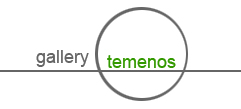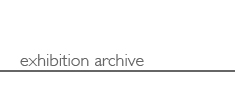The Participatory Universe
I grew up under the strong influence of science, surrounded by its practitioners, raised with those always willing to create a hypothesis for one highly inquisitive child. For a time I felt that it was the field I belonged in, but I realized that the lessons I learned studying science never felt truly important until I applied them to art. The process of creating something visually with a concept in mind is a lot like an experiment. The end result is unknown until you are finished, but the sense of understanding, even in failure is clear because it has been earned. Through all of my visual projects, I have embraced methods and themes of experimentation and study. I look for connections that can be made between the natural world and the unseen reality that underpins it, but I am also seeking humanistic connections between those people that study science and those of us who are simply fascinated by it. It is my belief that many of us look to science in a similar way that we seek art, not for cold calculation, but instead for a story, something to challenge us, and a new mystery for our minds to unravel. In my work, I reveal stories based on science that exist beneath the surface of our visible reality and ask viewers to share in my sense of discovery, absurdity, and emotion that I associate with the people and themes of science.
Both fields are built upon the process of creating analogies and models to describe what is occurring in realms that we cannot examine with our natural senses. Tools are used to investigate, document, and understand processes that exist beyond what our eyes can perceive or what our fingers can detect. Whether the tool is a camera, a microscope, a pen or a particle accelerator, these become devices through which an explorer can not only further their own understanding, but also provide evidence to share with others. I embrace many different tools in my quest to explore my own unseen reality, but photography has always been my primary instrument. With its unique and tenuous connection with truth, evidence and culture, photography is the perfect medium to investigate how our reality is guided by unclear, invisible theories of science. Just as quantum mechanics demonstrates how interactions of energy and matter change depending on how we choose to view them, the connotations of truth within a photographic image can be strongly influenced by the choice of camera format or printing. No other medium embraces veracity in this manner, and because of that, photography has great power. However, there is also potential in the combination of photography with other mediums, and I welcome the results of such explorations and often include computer graphics, drawing, installation, sculpture, video and the use of laser-cutters into my process. Each of my projects serves as a means to connect the scientific concepts I admire with the visual metaphors that I crave, through which I enhance my own personal sense of understanding, while facilitating a dialog and shared sense of discovery with my audience and collaborators. |
Jay Gould is an artist and a member of the faculty at the Maryland Institute College of Art (MICA). Originally from Minneapolis, Minnesota, Gould recieved his B.F.A. in photography from the University of Wisconsin and his M.F.A. from the Savannah College of Art & Design in Georgia. His work, which integrates scientific topics into photographic projects, has won numerous national awards, such as the Berenice Abbott Prize for an emerging photographer, the Jeannie Pierce Award, and First Place at the Newspace Center for Photography's International Juried Exhibition. Gould's work is widely exhibited around the country, making solo and group exhibition appearances at the University of Notre Dame, The Julia Dean Gallery in Los Angeles, the Fort Collins Museum of Contemporary Art, and the Griffin Museum, just to name a few. Gould also participates in the larger artistic community as a member of the faculty at the Maine Media Workshops, the Chair of the Society for Photographic Education's SouthCentral regional board and as a frequent visiting lecturer at a variety of schools and conferences.
http://jgould.net |





